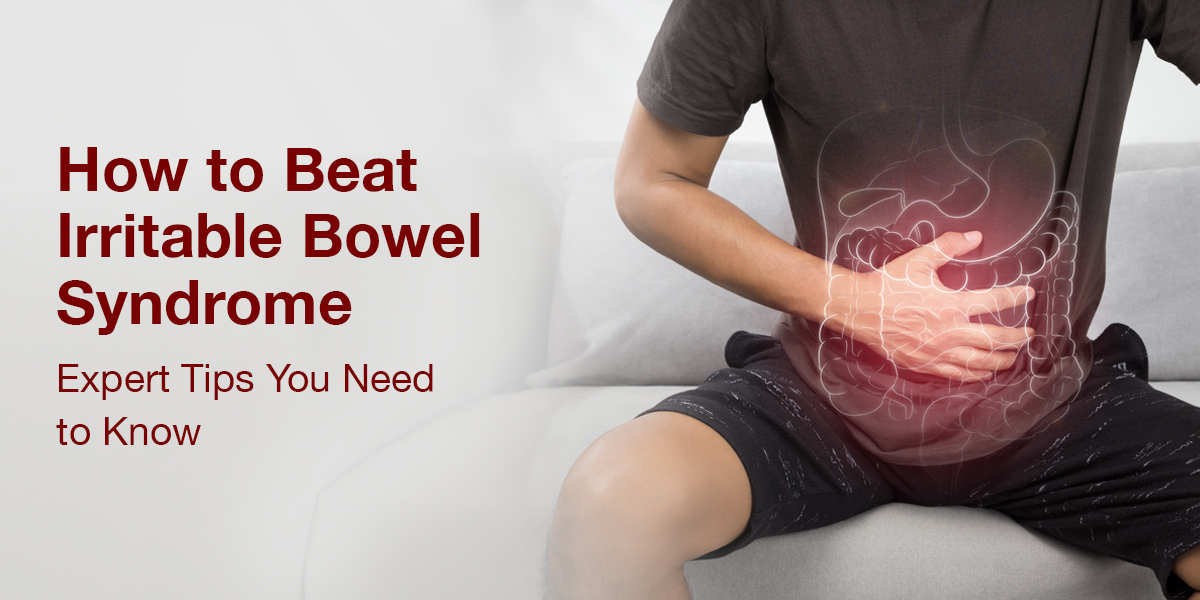How to Beat Irritable Bowel Syndrome: Expert Tips You Need to Know

Do you frequently suffer from unexplained stomach aches? It can be irritable bowel syndrome. This condition can hamper your day-to-day life. However, effective management can help you ease your troubles. In this blog, we will understand what irritable bowel syndrome is, its symptoms, and the treatment for it.
What Irritable Bowel Syndrome Means
Irritable bowel syndrome, or IBS, is a common medical condition affecting your stomach and intestines. While most of the symptoms are mild, some people also develop chronic symptoms. Chronic IBS can be treated by managing your lifestyle, stress, and diet. For several symptoms, you need to seek immediate medical attention.
Check If You Have These IBS Symptoms
IBS symptoms vary from time to time. However, mostly you’ll notice the following complications.
- Pain, cramping, or bloating in your abdomen
- Appearance changes in your bowel movement
- Frequency change of your bowel movement
Besides these primary symptoms, you may even struggle with an incomplete evacuation of gas and an increase in the gas buildup of mucus in your stool.
Causes of IBS You Should Know
While the exact causes of irritable bowel syndrome are still unknown, here are a few factors that you can keep a check on:
Contraction of Your Intestinal Muscle
Your intestinal walls are lined with muscle layers that contract as they help the food pass through them. Muscular contractions lasting longer may result in gas, bloating, or diarrhea. On the contrary, weak contractions may lead to dry stools.
Issues in Nervous Tissue
Poor coordination between your brain and your intestine may trigger your body to overreact to specific environmental changes in your digestive system. This further leads to diarrhea, pain, and constipation.
Severe Infection
If you recently encountered severe diarrhea, you might develop symptoms. Bacterial or viral infections are generally the reason behind it. This condition is called gastroenteritis.
Changes in Gut Flora
Your intestine has a natural microflora inside it. These microorganisms typically keep your gut healthy. People showing IBS symptoms have different flora than those without it.
Suggested Read: Understanding Gastrointestinal Endoscopy
Tips to Manage IBS
Irritable bowel syndrome or IBS symptoms can be easily managed with a few steps. The treatment focuses on relieving the symptoms to help you lead a healthy life. If the symptoms are relatively mild, you can regulate the symptoms by managing your stress, lifestyle, and diet. Here are a few home remedies to manage IBS.
- Avoid foods triggering the onset of IBS symptoms Avoid foods triggering the onset of IBS symptoms
- Increase the levels of your intake water/liquid
- Sleep enough
- Make exercise your routine
- Include high-fiber food in your daily diet
If you check with the best gastroenterologist in Lucknow for IBS treatment, they may recommend you avoid the following foods from your daily diet.
Avoid Gluten Consumption
Gluten is the next cause of triggering the symptoms of irritable bowel syndrome. Try avoiding gluten-rich foods such as rye, barley, and wheat.
Check for FODMAPs
Check whether you are allergic to certain carbs such as fructans, lactose, fructose, etc. These are known as FODMAPs.
Fiber Supplements
Supplements such as metamucil or psyllium are beneficial in controlling constipation.
Laxatives
If fiber supplements do not help you, pick over-the-counter laxatives such as polyethylene glycol or magnesium hydroxide.
Medications for IBS Treatment
Below are certain medications that have been approved, especially for treating your symptoms.
Anticholinergic medicines
Dicyclomine is an excellent anticholinergic medicine to relieve irritable bowel syndrome symptoms.
Anti-diarrheal medicines
There are certain anti-diarrheal medicines to help you manage your symptoms, such as loperamide, cholestyramine, or colestipol.
Eluxadoline
Eluxadoline helps to ease your diarrhea symptoms by working on your muscle contractions and secretion of fluids within your intestine. It also supports toning your intestinal muscles.
Lubiprostone
Lubiprostone works by increasing the secretion of fluid in your small intestine. This supports passing stools and is widely recommended for women suffering from IBS symptoms.
All these medicines are prescription-only. Ensure you check with your gastroenterologist before consuming any of the above medications.
Conclusion
Irritable Bowel Syndrome can be a real pain to deal with if you are not very aware of IBS symptoms and treatment. The first and foremost thing is to manage your stress level and closely watch what you eat. Talk with your gastroenterologist about adopting a better lifestyle to manage IBS effectively.

 Call-an-Ambulance
Call-an-Ambulance



